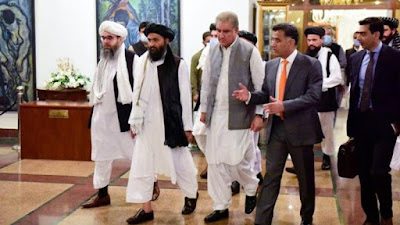Afghanistan–Do not push Taliban to the wall
Afghanistan: Pakistan should not push Taliban to the wall
Jan Achakzai
Much has been written about Pakistan-Afghanistan relations, Pakistan has strategic interest in Afghanistan that it is not a sanctuary to proxy groups like the TTP, BLA, and other outfits fighting Islamabad as an extension of India's indirect warfare in Balochistan and other borderlands like ex FATA region. Any solution to Afghan conflict is a must to reflect Islamabad's genuine security concerns.
Since the Kabul administration is a semi-client regime of Delhi willingly playing Indian strategic Afghan chess game, it has no incentive to reign in these anti-Pakistan militant groups. So comes Pakistan's leverage on the Afghan Taliban as a hedge against Afghanistan's recognition of implicit suzerainty of and sphere of influence by India, its irredentist claim on Pakistan's western border, its levers of ethnic/racial groups in KP and Balochistan and other variables aimed to create instability in Pakistan.
While the US has almost sublet the peace making effort to Islamabad, the Biden admin has put pressure to deliver Taliban on the peace table. Pakistan has been playing a constructive role on Afghanistan's peace quest and still obliging: It has influenced the Taliban to negotiate with the US, enter into intra Afghan dialogue and reduce violence; it has underlined the Pakistani redline no more seeking Islamic Emirates' restoration or any forceful takeover of Kabul by the Taliban.
However, peace making in Afghanistan is the project shared by other stakeholders mainly: The non-Taliban Afghan groups have higher stakes in the current Afghan order to relinquish access to power, money and perks so the political economy suggests they will have least mcentive to make a peace deal with the Taliban.
Regional powers including the US are prodding these groups to act as proxy if needed in the post US-Afghanistan. Even the CIA and MI6 have reportedly cultivated the son of late Ahmed Shah Massod to fight as per the New York Times' report. There are groups and individuals who have amassed huge wealth probably up to $500 millions to recruit Militias and continue fighting after the US withdrawal.
These fears come on the heels of a stark warning by President Biden, in messaging: " We are going anyway whether you are ready or not, conditions met or not' plunging the region into uncertainty. Regional players are perplexed where particularly Pakistan has been singularly mentioned to shoulder the responsibility of post-US Afghanistan. Afghan stakeholders are fearing the repeat 1990s, (e.g. civil war and abandonment by the international community)
So what should Pakistan do?
Islamabad has a balancing act: not to push the Taliban to the extent of losing leverage, regardless, when they are poised to win on the battlefield and also getting credit for "defeating another super power".
But also Pakistan has incentive to press the Taliban to come to the intra-Afghan table in Turkey, get rid of the Ghani govt and stamp out other Indian proxy elements through a peace settlement agreement. So with a combination of luck, deft, diplomacy and some hard leverage Pakistan will be able to achieve these goals, though a tall order.


Comments